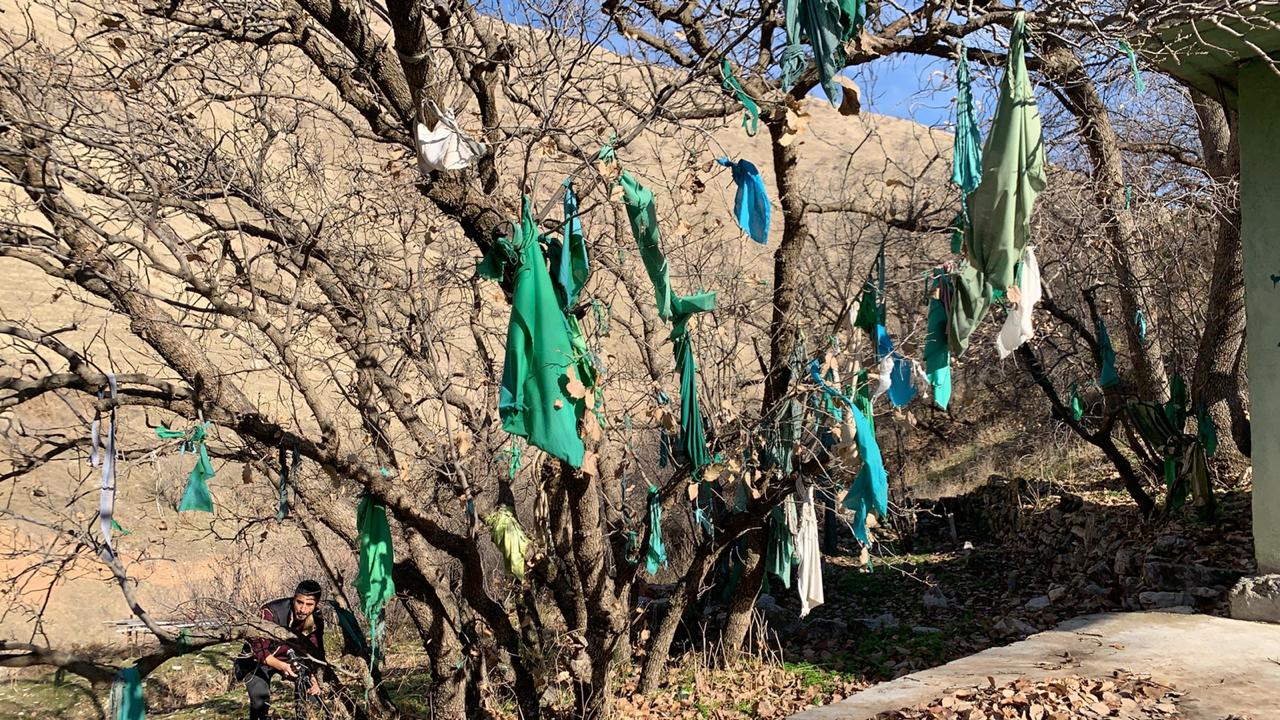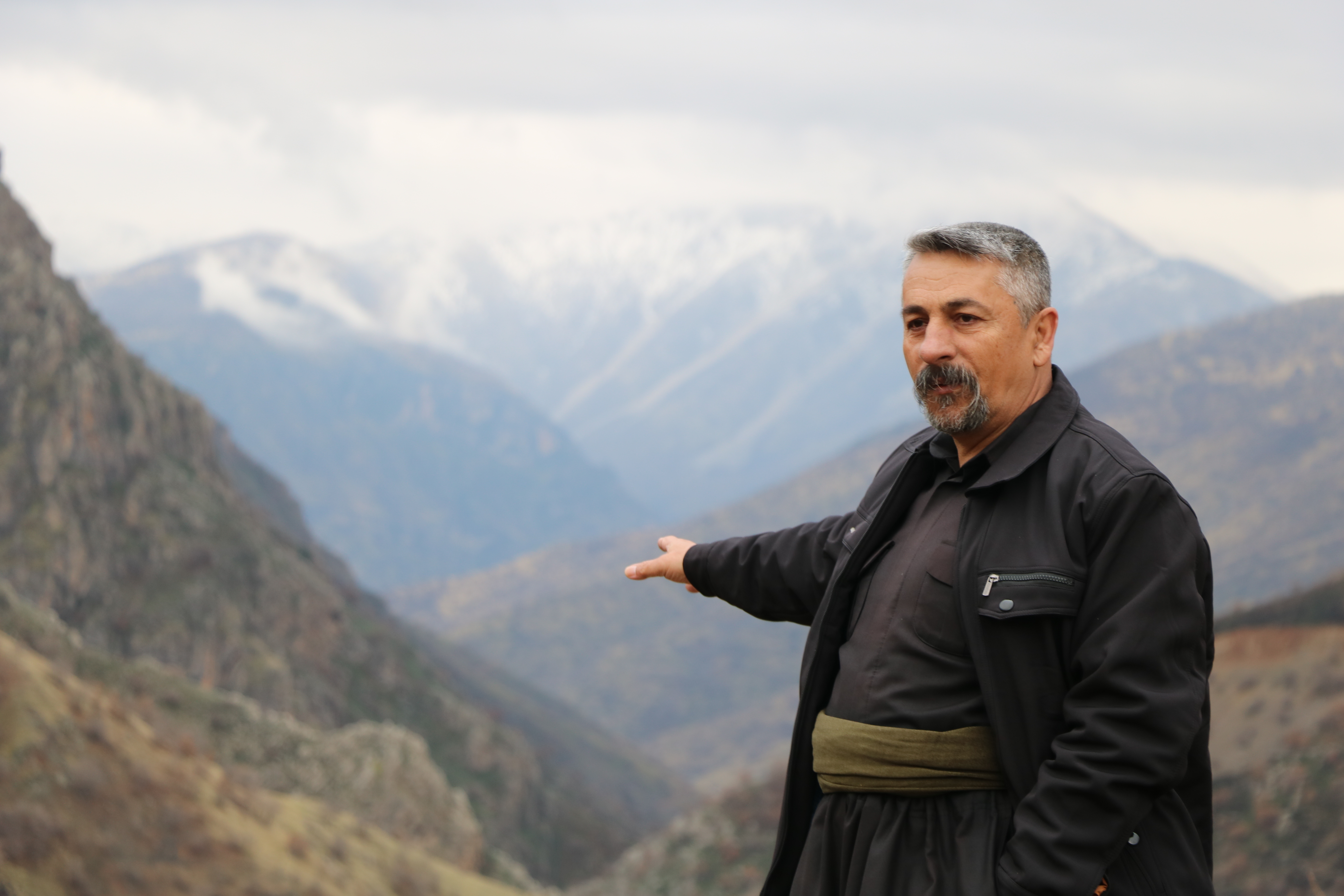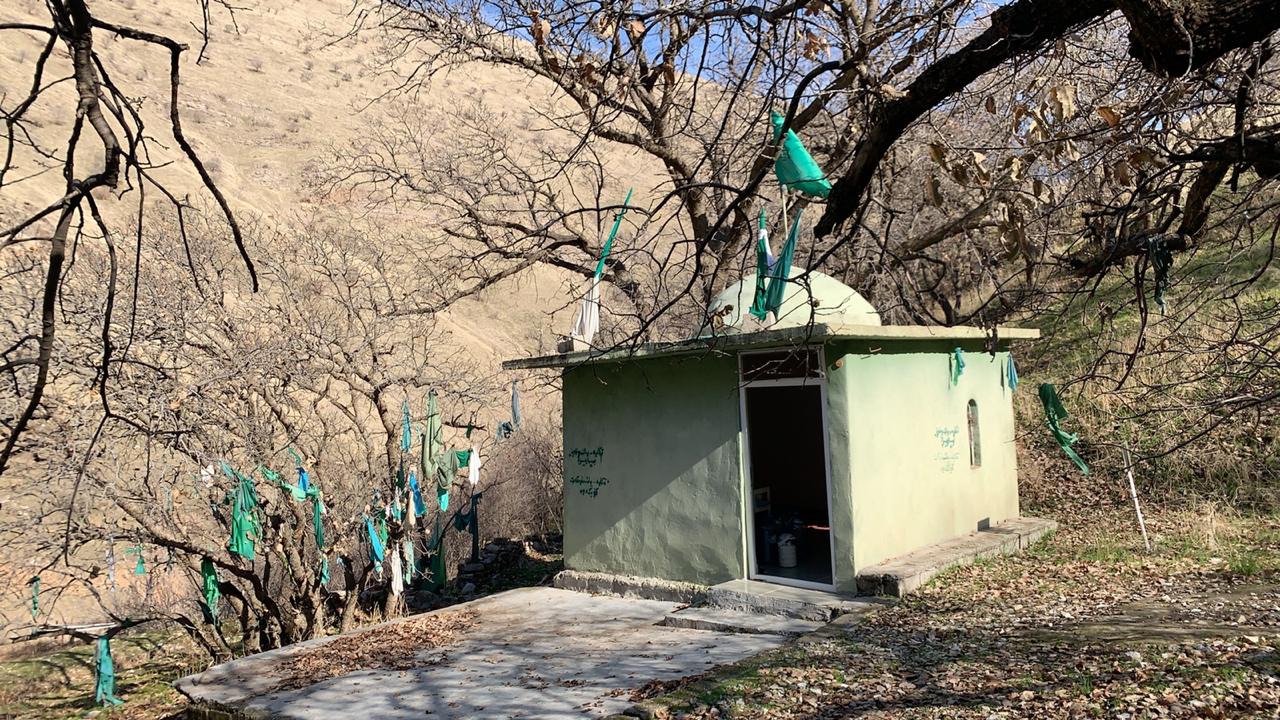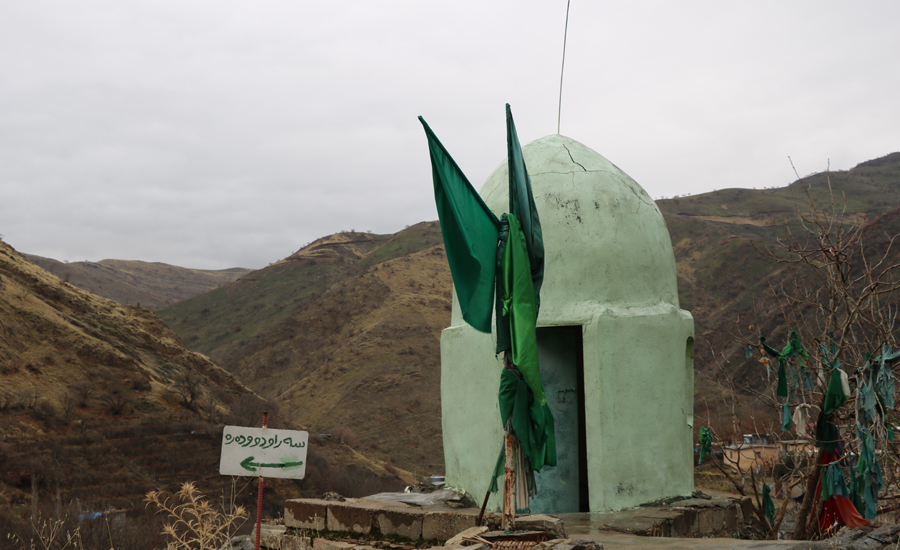In peace and war, even under the rule of one the extremist sectarian groups, the Kaka'is of Hawar practiced their ancient religious rituals overcoming the challenges over centuries.
Residents of the Hawar village, 15 km south east of Halabja in Sulaymaniyah, practice Kaka'i, or Yarsanism, a religion mostly practiced in Iraq and Iran. Kaka'i followers are about 100,000, mostly found in northern provinces of Sulaymaniyah, Kirkuk, Erbil, Nineveh, up to Diyala in the middle of Iraq.
Hawar, adjacent to Shinirwy Mount, is one of the oldest sacred destinations for Kaka'is, dated back to 984 years ago, home to 800-1000 families. The village embraces 50 orchards though not inhabited in all seasons.

January 2021: Hawar, home for Kaka'is. Photo: Salam Omer
Hawar defies tough challenges
In 2001, the extremist Islamic group of Ansar Al-Islam, later named Jund al-Islam, took control of Hawar and surrounding region up to 2003.
This was a major threat not only to the village but for the whole religion and culture of Kaka'i. Once the extremists took control of the area, “we deserted our village because we could not agree with their beliefs so our houses were damaged by rain and snowfall,” Ramazan Hamirkhan known as Kosari, a well-known figure of Hawar Kaka'is told KirkukNow.
“we deserted our village because we could not agree with their beliefs so our houses were damaged by rain and snowfall,”
The Kaka'is had either to pay ransom, join Islam, fight Jund al-Islam or leave the area, dictated the group, allegedly following Islamic Sharia. “We decided to leave but they did not touch the shrine or even one piece of cloth of hung over the wholly tombs,” Kosari recalls. “They stayed for a short while and told us they will demolish Hawraman area and come back to us because you have your own religion and you are defectors.”
The US-led international coalition targeted the group headquarters in 2003 by airstrikes putting an end to the group rule alongside toppling Saddam Hussein regime.
The Kaka'i religion and its homeland
Kaka'i or Yarsanism is a monotheist spiritual religion that has no special places for worship. Its history dates back to adventure of humanity.
Sultan Sahak, son of Sheikh Essa of Barzinja, born in Barzinja in the 7th century, is considered the founder of Kaka'i. He lived in the villages of Hawar and Shekhan where he was preaching his religion. The followers are mainly Kurds from both sides of Hawraman region, home to Hawrami dialect speaking Kurds on the Iraq-Iran border territories.
Kochar Hidayat, 40, a Kaka'i follower, visits Hawar every week. “Socially, we are in very good social ties with all people who consider us a symbol of respectfulness because we hurt nobody and no one hurt us,” he proudly spoke to Kirkuk now.
“Socially, we are in very good social ties with all people who consider us a symbol of respectfulness because we hurt nobody and no one hurt us,”
One of the characteristics of Kaka'i men is growing mustache. “As a Kaka'i tradition, I grew my mustache which we consider sacred,” Hidayat said.
Hidayat is a Peshmarga of Patriotic Union of Kurdistan PUK, based in Sulaimaniyah led by co-presidents, one of them son of former Iraqi president Jalal Talabani. Hidayat’s unit is based in Kulajo, in Garmiyan district, with his Sunni and Shiite Muslim colleagues. “We enjoy a good relationship,” he added.
There are 18 Kaka’i shrines across Iraq, seven of them located in Kirkuk province. The most famous of them are: sayyid-Ibrahim Shrine in Baghdad and the sayyid-Baba Yadgar Shrine in Iran, which most Kaka'is visit to pray for curing diseases and fulfilling their wishes.
Kaka'i shrines in Hawar are Shah-Khoshen, Sayyid Khamosh, Meer Eskandar, Khalifa Smayil, and a place for religious speeches at the top of the mountain at the entrance of Hawar.
Iraqi constitution does not recognize Kaka'i as a religion but KRG bill of miniroties does. Hawar people are represented in Halabja Provincial council.
Tolerance and patience of Kaka'is in general and of Hawar residents in particular made their survival easier. They enjoy a fairly safe, stable and free community.

Akbar Karim, a well-known Kaka'i personality of Hawar. Photo: Ma'az Farhan
“I do not rememebr being under pressure in Hawar except during Ansar al-Islam era,” Akbar Karim, 50, a teacher and well-known figure of Hawar Kaka'is, said.
Karim was standing near three stores old deserted shops in Hawar, built by stone and wood. “We amanged to get along with all groups came to the area, came to agreement with them and never had any hostile issues.”
“We managed to get along with all groups came to the area, came to agreement with them and never had any hostile issues.”
Karim recalls Hawar was lively till 1978 when they were taken to Halabja but never had to hide their religious identity. They shared their happiness and griefs with the Muslim community surrounding them. “We were heartly participating in death ceremonies in the neighbor villages and they were exchanging the same feelings.”
He believes that modern lifestyle and technology impacted Kurdish traditional, socail and religious affiliations, in reference to religious commitment of younger generations.
The holly book of Kaka'is is called Saranjam and its script is called Kalam.
Truth, virtue, selflessness and tolerance are the pillars of Kaka’i religion. Followers should be moderate and temperate.
“We speak the Macho dialect and recite Kalam. Our religion is spiritual, its a relationship between self and God. Mustache growning is a religious commitment to distinguish the followers though younger generations rarely do,” Kosari elaborates.
“There are several non-printed versions of Saranjam that we can not print in order to avoid discrepancy,” he added. “A Kaka'i without Mustache is like a Muslim who is not conducting the (five-daily) prayers.”
Peacefulness and harmlessness
Among the public calls for political and economic reforms in Kurdistan and Iraq, Kaka'is in Hawar have no complaints. The local authorities have not implemented startegic public services in Hawar which resembles a painting at the heart of the mountain yet the Kak'is are consented.
The street to the village is paved and supplied with electricity but no government offices are there. There is no school and the health center has been shut since many years.
“People do not live permanently here though they have built cosy houses. They come in summer and visit it Hawar regularly,” Karim said.
Kaka'is of Hawar have no hall for their ceremonies except one for mourning ceremony and a grave yard. They also bury the dead in Halabja graveyard next to to their Muslim neighbours.

January 2021: a wholy shrine of Kaka'is in Hawar. Photo: Salam Omer
Women and marriage in Kaka'i community
Marriage under Kaka'i is religious making interreligious marriage undesirable. Couples aged 18 can get married. Though polygamy is not forbidden but it's not common.
Women have same priviliges of men. Divorce is allowed once treason is proven. Marriage contracts can be registered at civil courts, and blessed by a Kaka'i religious figure or by a Muslim cleric. Females get a gold dowry alike Muslims.
Kaka'is protect the Environment
Hawar is amid several high and snowy mountains. The oak trees climb the edges of its mountains along the pool overlooking nuts and pomegranate orchards.
“Hawar land is as sacred as anywhere else. Protection of the environment is a religious duty as free humans are the center of the envrinment. We also have texts that bans hunting,” Akbar said.





